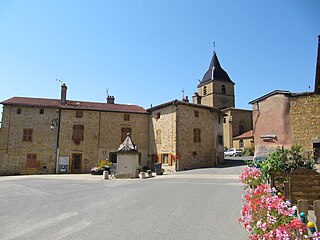Related Research Articles
Catharism was a Christian dualist or Gnostic movement between the 12th and 14th centuries which thrived in Southern Europe, particularly in northern Italy and southern France. Followers were described as Cathars and referred to themselves as Good Christians; in modern times, they are mainly remembered for a prolonged period of mutual conflict and religious persecution – sometimes regarded as genocide – by the Catholic Church which deemed Catharism a heretical sect.

The Province of Languedoc is a former province of France. Most of its territory is now contained in the modern-day region of Occitanie in Southern France. Its capital city was Toulouse. It had an area of approximately 42,700 square kilometers.

The Albigensian Crusade or the Cathar Crusade was a military and ideological campaign initiated by Pope Innocent III to eliminate Catharism in Languedoc, what is now southern France. The Crusade was prosecuted primarily by the French crown and promptly took on a political aspect. It resulted in the significant reduction of practicing Cathars and a realignment of the County of Toulouse with the French crown. The distinct regional culture of Languedoc was also diminished.

Languedoc-Roussillon is a former administrative region of France. On 1 January 2016, it joined with the region of Midi-Pyrénées to become Occitania. It comprised five departments, and bordered the other French regions of Provence-Alpes-Côte d'Azur, Rhône-Alpes, Auvergne, Midi-Pyrénées towards the north, and Spain, Andorra and the Mediterranean Sea towards the south. It was the southernmost region of mainland France.

Béziers is a city in southern France. It is a subprefecture of the Hérault department in the Occitanie region. Every August Béziers hosts the famous Feria de Béziers, which is centred on bullfighting. A million visitors are attracted to the five-day event.

Emmanuel Bernard Le Roy Ladurie was a French historian whose work was mainly focused upon Languedoc in the Ancien Régime, particularly the history of the peasantry. One of the leading historians of France, Le Roy Ladurie has been called the "standard-bearer" of the third generation of the Annales school and the "rock star of the medievalists", noted for his work in social history.

John of Berry or John the Magnificent was Duke of Berry and Auvergne and Count of Poitiers and Montpensier. He was Regent of France from 1380 to 1388 during the minority of his nephew Charles VI. His brothers were King Charles V of France, Duke Louis I of Anjou and Duke Philip the Bold of Burgundy.
The count of Toulouse was the ruler of Toulouse during the 8th to 13th centuries. Originating as vassals of the Frankish kings, the hereditary counts ruled the city of Toulouse and its surrounding county from the late 9th century until 1270. The counts and other family members were also at various times counts of Quercy, Rouergue, Albi, and Nîmes, and sometimes margraves of Septimania and Provence. Count Raymond IV founded the Crusader state of Tripoli, and his descendants were also counts there. They reached the zenith of their power during the 11th and 12th centuries, but after the Albigensian Crusade the county fell to the kingdom of France, nominally in 1229 and de facto in 1271.

Henry FitzJames, titular 1st Duke of Albemarle in the Jacobite peerage, was the illegitimate son of King James II of England and VII of Scotland by Arabella Churchill, sister of the first Duke of Marlborough.

Bagnols-sur-Cèze is a commune in the Gard department in the Occitania region in Southern France.

Languedoc-Roussillon wine, including the vin de pays labeled Vin de Pays d'Oc, is produced in southern France. While "Languedoc" can refer to a specific historic region of France and Northern Catalonia, usage since the 20th century has primarily referred to the northern part of the Languedoc-Roussillon region of France, an area which spans the Mediterranean coastline from the French border with Spain to the region of Provence. The area has around 700,000 acres (2,800 km2) under vines and is the single biggest wine-producing region in the world, being responsible for more than a third of France's total wine production. In 2001, the region produced more wine than the United States.
The Duke of Luynes is a territorial name belonging to the noble French house d'Albert. Luynes is, today, a commune of the Indre-et-Loire département in France. The family of Albert, which sprang from Thomas Alberti, seigneur de Boussargues, bailli of Viviers and Valence, and viguier of Bagnols and Pont-Saint-Esprit in Languedoc, acquired the estate of Luynes in the 16th century.

Pouzilhac is a French commune in the Gard department in southern France, formerly Languedoc-Roussillon.

Bagnols-en-Forêt is a commune in Var department in the Provence-Alpes-Côte d'Azur region in Southeastern France.

Bagnols is a commune in the Puy-de-Dôme department in Auvergne-Rhône-Alpes in central France.

Bagnols is a commune of the Rhône department in eastern France.
Football Club Bagnols-sur-Cèze – Pont-Saint-Esprit is a French football club based in Bagnols-sur-Cèze in the Occitanie region. The club was founded on 21 July 2000 following the merger of two local clubs; Union Club Bagnols Jeunesse and Indépendante de Pont-Saint-Esprit. Bagnols Pont currently plays in Régional 1, the sixth tier of French football, spending just one season at the Championnat National 3 level after achieving promotion in the 2021–22 season.
Thierry Alain Florian Taulemesse, known as Florian, is a French professional footballer who plays as a striker.

Occitania is the southernmost administrative region of metropolitan France excluding Corsica, created on 1 January 2016 from the former regions of Languedoc-Roussillon and Midi-Pyrénées. The Council of State approved Occitania as the new name of the region on 28 September 2016, coming into effect on 30 September 2016.
The 2016 Tour du Haut Var was a road cycling stage race that took place on 20 and 21 February 2016. The race was rated as a 2.1 event as part of the 2016 UCI Europe Tour, and was the 48th edition of the Tour du Haut Var.
References
 This article incorporates text from a publication now in the public domain : Chambers, Ephraim, ed. (1728). "Bagnolians". Cyclopædia, or an Universal Dictionary of Arts and Sciences (1st ed.). James and John Knapton, et al.
This article incorporates text from a publication now in the public domain : Chambers, Ephraim, ed. (1728). "Bagnolians". Cyclopædia, or an Universal Dictionary of Arts and Sciences (1st ed.). James and John Knapton, et al.